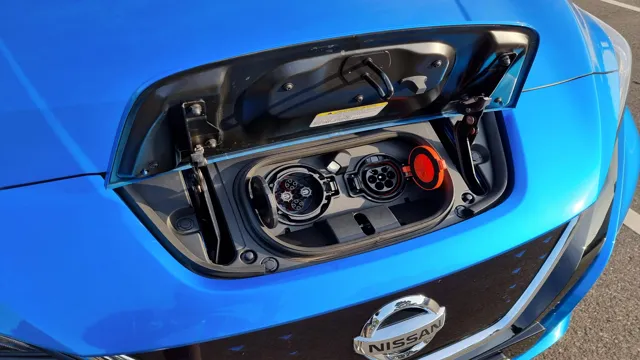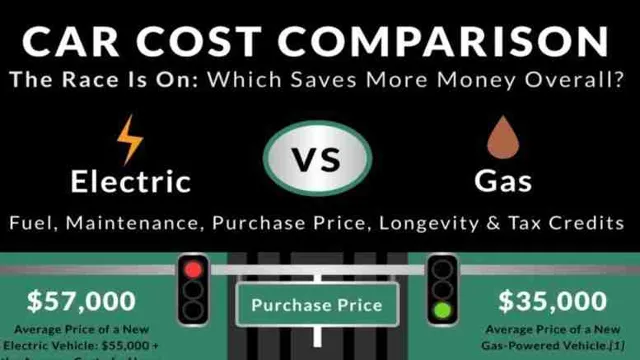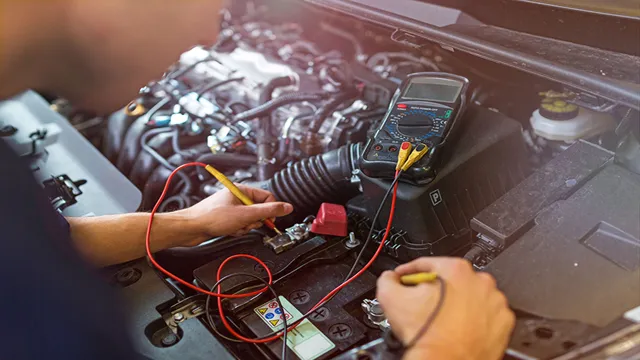Electric Car Maintenance Cost: A Comprehensive Guide to Keeping Your Electric Vehicle on the Road
Electric cars have become an increasingly popular alternative to traditional gas-powered vehicles. Not only do they produce zero emissions, but they can also provide drivers with long-term savings. However, one common concern for those considering making the switch to electric is the cost of maintaining the vehicle over time.
Unlike gas-powered cars, electric cars have different mechanical components and require unique maintenance procedures. So, what is the cost of maintaining an electric car? In this blog, we’ll explore the factors that contribute to the cost of electric car maintenance and help you determine if going electric is the right choice for your wallet.
Initial Costs
If you’re considering buying an electric car, the first thing to consider is the initial cost. Compared to regular gas-powered cars, electric cars are generally more expensive upfront. The cost of an electric car can range from around $30,000 to over $100,000 depending on the model and features you choose.
However, there are often state and federal incentives available that can help offset this initial cost. Additionally, electric cars are much cheaper to fuel. Instead of paying for gas, you’ll be charging your car’s battery, which is significantly less expensive than traditional fuel costs.
Overall, while the initial cost of an electric car may be higher than a gas-powered car, the long-term savings make it a smart investment for those who want to reduce their carbon footprint and save money.
Price comparison with gasoline cars
When it comes to buying a car, one of the biggest factors to consider is the initial cost. In the past, electric cars were typically more expensive than their gasoline counterparts. However, as technology has advanced and the demand for electric vehicles has increased, the cost of buying an electric car has come down significantly.
In fact, many of the most popular electric cars on the market today are now priced competitively with their gasoline counterparts. Of course, the price will vary depending on the specific make and model of car you’re looking at, but in general, electric cars have become much more affordable in recent years. When considering the initial cost of an electric car versus a gasoline car, it’s important to look at the total cost of ownership over the life of the vehicle, including fuel costs, maintenance costs, and resale value.
While the upfront cost may be slightly higher for an electric car, the overall cost of ownership may be significantly less over time.

Government incentives for electric cars
One of the biggest incentives for purchasing an electric car is the significant reduction in initial costs that can be provided by the government. Depending on where you live, there might be different schemes available, but they can include bonuses and grants that are given to buyers at the time of purchase. These incentives go a long way in making electric cars more accessible and affordable, particularly for those who might struggle to purchase a brand-new vehicle outright.
In many countries, governments are also offering tax breaks and exemptions to electric vehicle owners, which can help drivers save a significant amount of money in the long run. This not only makes electric cars a more affordable option, but it also incentivizes drivers to actively seek out more environmentally friendly ways to commute and travel.
Routine Maintenance Costs
How much does it cost to maintain an electric car? As compared to traditional gas-powered cars, electric cars have significantly lower maintenance costs. The main reason for this is that electric cars have fewer moving parts, which means less wear and tear. With no oil changes, fewer brake replacements, and no need for tune-ups, the overall cost of maintaining an electric car is much lower.
However, electric car maintenance costs do vary depending on the model and the brand. High-end electric cars may have more advanced features, which increases the price for repairing or maintaining them when necessary. Additionally, just like with conventional cars, it’s important to regularly check tire pressure, brakes, and other safety features to ensure they’re working properly.
Overall, owning an electric car is cheaper in the long run due to their lower operating and maintenance costs, making them an excellent choice for those who want to save money and the environment.
Battery replacements and costs
When it comes to routine maintenance costs for electric vehicles, battery replacements are one of the most significant expenses to consider. As with any rechargeable battery, the lifespan of an EV battery will eventually come to an end, requiring a replacement. The good news is that battery technology and costs have significantly improved over the years, resulting in more affordable and efficient replacement options.
The cost of a new battery will typically depend on the make and model of your EV, but it could range anywhere from $3,000 to $10,000. However, it’s important to keep in mind that battery replacements are not a yearly occurrence, and with proper care and maintenance, your EV battery may last up to 8-10 years before requiring a replacement. So, while the cost may seem daunting at first, it’s a small price to pay for the long-term benefits that electric vehicles provide.
Tire replacements and costs
When it comes to routine maintenance costs, tire replacements can be a significant expense for car owners. Depending on the type of vehicle and the quality of the tires, prices can vary greatly. It’s important to keep an eye on the tread depth and overall condition of the tires, as worn-out or damaged tires can compromise the safety of the vehicle and its passengers.
A good rule of thumb is to replace tires every 40,000 to 60,000 miles, but this can vary depending on driving habits and road conditions. While it may seem expensive at first, investing in high-quality tires can save money in the long run by improving fuel efficiency, reducing the risk of accidents, and increasing the overall lifespan of the vehicle. It’s best to shop around and compare prices before making a decision, as there are many options available at various price points.
Brake replacements and costs
Brake replacements are a normal part of routine maintenance and can be an unexpected cost for car owners. The cost of replacing brakes can vary depending on the type of car, the severity of the damage, and the location of the repair shop. Some repair shops may offer discounts on brake replacements or the option of using aftermarket parts to save on costs.
However, it’s important to remember that the safety of your vehicle shouldn’t be compromised for cost-saving measures. Opting for high-quality OEM parts may be more expensive initially, but can save you money in the long run by reducing the need for frequent replacements. So, if you’re experiencing brake issues, don’t put off fixing them.
It’s better to be safe than sorry and get them replaced sooner rather than later to avoid further damage to your vehicle and potential safety risks on the road.
Long-Term Cost Savings
“How much does it cost to maintain an electric car?” is a common question among many who are considering purchasing an electric vehicle. While the upfront cost of an electric car may be higher compared to a traditional gasoline-powered vehicle, the long-term cost savings can be significant. For one, electric cars require less maintenance since they have fewer moving parts and don’t require oil changes.
Additionally, electricity is cheaper than gasoline, which means you’ll save money on fuel costs. Additionally, some states offer tax incentives to electric car owners, further reducing the cost to own and maintain an electric car. Overall, while the initial cost of an electric car may be higher, the long-term cost savings make it a worthwhile investment for both the environment and your wallet.
Fuel and energy savings compared to gasoline cars
When it comes to long-term cost savings, electric cars clearly have the upper hand compared to traditional gasoline cars. Aside from a lower cost of ownership, electric vehicles provide significant fuel and energy savings. For starters, they are much cheaper to charge than fill up with gasoline, and can save drivers hundreds if not thousands of dollars per year in fuel costs alone.
Not to mention that electric cars require much less maintenance than gas-powered cars, which can add up to even more cost savings over time. Another advantage is that electric cars can be powered using solar or wind energy, which can reduce dependence on non-renewable sources of power. So, not only are electric cars more budget-friendly, but they are also better for the environment.
It’s no wonder that more and more people are opting for electric cars as their primary mode of transportation.
Tax credits and other long-term savings
When it comes to saving costs on taxes, many people overlook the long-term benefits of taking advantage of tax credits. This is especially true for those who are self-employed or own a business, as there are a variety of credits available for things like investing in renewable energy or providing healthcare for employees. While these credits may not provide immediate savings, they can add up over time and significantly reduce your tax burden in the long run.
In addition, investing in energy-efficient equipment or practices can also result in long-term savings on energy bills and maintenance costs. It’s important to take the time to research and understand the different tax credits available to you, as well as the potential long-term savings that come with them. By doing so, you can make smart decisions that benefit both your business and your bottom line.
Conclusion
In the end, the cost of maintaining an electric car really depends on how much you enjoy taking it for a spin. If you’re someone who loves the sound of silence and the thrill of acceleration, then it’s worth shelling out a few extra bucks for the occasional tune-up and battery replacement. And if you’re not quite ready to make the switch just yet, that’s okay too.
One thing’s for sure: whether you’re a die-hard EV enthusiast or simply curious about the future of transportation, exploring the world of electric cars is sure to make you a more informed and environmentally-conscious driver.”
FAQs
What are the typical maintenance costs for an electric car?
The maintenance costs for an electric car can vary depending on the make and model of the vehicle, but they are generally lower than those of traditional gas-powered cars. On average, maintenance costs for an electric car could range from $300 to $700 per year.
Do electric cars require more or less maintenance than gas-powered cars?
Electric cars generally require less maintenance than gas-powered cars because they have fewer moving parts and don’t need oil changes. However, some components like brakes, tires, and suspension may require more frequent servicing due to the extra weight of the batteries.
What specific maintenance tasks are required for electric cars?
Some typical maintenance tasks for an electric car include checking and replacing the battery coolant, inspecting the brake pads and rotors, balancing and rotating the tires, and checking the condition of the electric motor and charging system.
Are there any additional maintenance costs for electric cars compared to gas-powered cars?
One potential additional maintenance cost for electric cars is the replacement of the battery, which can be expensive and may need to be done every 5-10 years. However, this cost is offset by the savings on fuel and other maintenance tasks like oil changes, spark plugs, and air filters.





